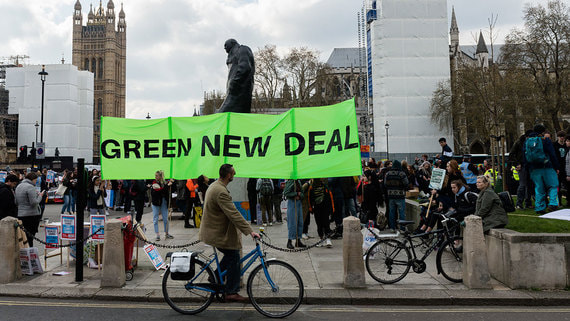Britain lacks funds to help other countries on climate issues
[ad_1]

Britain may not have enough funds to meet climate change commitments. A document came into the possession of The Guardian, from which it follows that the government is very skeptical about the idea of doubling spending on assistance to countries vulnerable to climate change in the period from 2019 to 2026. In total, between 2016 and 2021, London sent climate change £5.8 billion ($7.37 billion). “Our commitment to double international climate finance to £11.6bn was made in 2019 when we were still spending 0.7% [ВВП на международную помощь] and did not face the coronavirus pandemic,” the document cited by the newspaper said. The authorities believe, according to The Guardian, that the achievement of the specified goal by 2026 will be a “serious challenge” due to pressure on the budget, including initiatives to help Ukraine.
In addition, as the newspaper writes, the fulfillment of obligations on time would force the British Foreign Office to spend 83% of the funds allocated for “development” assistance for climate purposes abroad and would crowd out other initiatives. The new British Prime Minister Rishi Sunak announced on November 7, 2022 that London would not abandon this program. The same thesis was repeated by The Guardian by a representative of the country’s government. But news of the British prime minister’s desire to waive his climate funding commitments has drawn backlash from former ministers and representatives of countries most vulnerable to climate change. They accused Sunak of making false promises, the paper said. In addition, against the backdrop of this discussion (June 30), Climate and Environment Minister Zach Goldsmith resigned, citing the premier’s “lack of interest” in climate issues as the reason for his resignation.
Traditionally, Britain tries to maintain the image of a country that is extremely active in the humanitarian sphere, explains Elena Kharitonova, senior researcher at the Sector of International Organizations and Global Political Regulation of the IMEMO RAS. London claims to be a country of “global responsibility”, but now the British are facing serious economic problems that significantly limit the ability of London to conduct such an active international activity. The reason for this, according to the expert, is not only in the Ukrainian crisis – British society is still suffering from the consequences of Brexit and the COVID-19 pandemic. The British are facing social problems, a crisis in the cost of living, and all this leads to the fact that the government is forced to reduce its obligations to meet the needs of the population, the expert concludes.
A year ago, the House of Lords sharply criticized the government (then Boris Johnson) for putting forward too ambitious goals in climate policy, because the UK simply does not have the resources for this, says Sergei Shein, Associate Professor at the Faculty of World Economics and International Politics at the National Research University Higher School of Economics. Sunak is on a cost-cutting path since he came in as a crisis manager, but the government doesn’t yet have economic victories to showcase to an internal audience. Therefore, Sunak can optimize this direction of foreign policy in order to resolve socio-economic issues and present it to the electorate in next year’s elections, Shein continues. The concept of “global Britain”, the country’s foreign policy, implies a serious role in solving world problems and, accordingly, the budget allocated for this. But now the UK is participating in solving world problems more rhetorically than with the help of real budget items, largely because of its socio-economic vulnerability, Shein said.
[ad_2]
Source link








